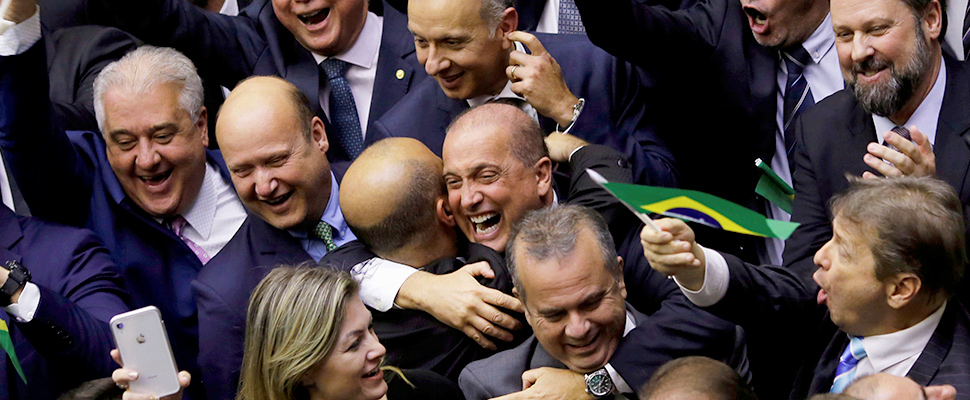Brazil’s pension system is going to change
Pension reform is the cornerstone of right-wing President Jair Bolsonaro's economic agenda

Lawmakers and supporters of the pension reform bill, celebrate the vote of the bill at the plenary session of the Chamber of Deputies in Brasilia, Brazil July 10, 2019. REUTERS/Adriano Machado
Reuters | Maria Carolina Marcello and Lisandra Paraguassu
Listen to this article
Brazil's lower house of Congress approved a landmark overhaul of the country's pension system on Wednesday by a far wider margin than predicted, delivering a resounding victory to the government in its quest to revive public finances.
Leer en español: El sistema de pensiones en Brasil está por cambiar
The lower house passed the main text of the bill by a vote of 379 in favor and 131 opposed, well beyond the 308 votes required. The chamber is expected to vote on any amendments to the bill on Thursday.
House Speaker Rodrigo Maia said he hoped the complete bill could be put to a second, final vote by Friday or early Saturday. That would allow the Senate to take up debate in August after a two-week recess.
Pension reform is the cornerstone of right-wing President Jair Bolsonaro's economic agenda, aimed at saving the public purse around 1 trillion reais ($263 billion) over the next decade as he tries to close a massive budget gap.
Wednesday's vote followed months of acrimonious political drama, with Bolsonaro drawing fire from both leftist lawmakers opposing the social security cuts and from the bill's proponents who blamed him for slowing progress of the controversial proposal.
"Brazil is ever closer to getting on the path to jobs and prosperity," Bolsonaro said on Twitter, congratulating Maia following the vote.
As he announced the vote tally, Maia said it was time for Congress to take a more central role in governing the country, after what he called some three decades of an erosion of its power in favor of the executive branch.
Also read: Ecuador to join market-friendly Pacific Alliance under Moreno
"Our duty is to take back the power of the lower house and the Congress," Maia said. "In taking back the strength of the lower house, we strengthen our democracy."
He defended his allies in the centrist 'Centrao' coalition, whom Bolsonaro has accused of perpetuating old-school transactional politics.
"Often our party leaders are disrespected," Maia told the packed plenary. "But it is the Centrao that is carrying out pension reform – the parties of the so-called Centrao."
Brazilian markets had bet heavily on Wednesday that the bill would pass, although few had projected such a wide margin.
Brazil's benchmark Bovespa stock index closed 1.23% higher, reducing gains after hitting an all-time high of 106,650 points. The country's currency, reais, hit 3.7585 to the U.S. dollar, its strongest level since February.
Interest rate futures fell across the curve as traders bet that approval will pave the way for the central bank to lower interest rates.
The Economy Ministry says Brazil's growth and inflation prospects for years to come will rest on closing the huge budget gap created by the country's generous pension system.
But the changes are controversial. Raising the retirement age, increasing workers' pension contributions, and reducing some workers' pension benefits have provoked strong opposition, although most lawmakers have come around to the idea that the deficit problem must be tackled.





